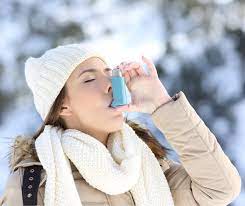The Importance of Winter Asthma Preparedness
Categories: Others

The Importance of Winter Asthma Preparedness
Winter asthma preparedness is crucial for individuals with asthma as the cold weather and specific winter conditions can exacerbate symptoms. Being proactive in managing your asthma during the winter months can help prevent attacks and ensure better overall respiratory health. Here's why winter asthma preparedness is important:
Cold Air Triggers:
Cold and dry air can be a significant trigger for asthma symptoms. It can cause airway constriction and irritation, leading to increased asthma symptoms.
Preparedness: Dress warmly, cover your nose and mouth with a scarf or mask when outdoors, and consider using a rescue inhaler before exposure to cold air it’s a winter asthma preparedness.
Increased Respiratory Infections:
Winter is frequently connected with an expansion in respiratory contaminations, like this season's virus and the normal virus.
Preparedness: Warm up prior to working out, inhale through your nose, and think about utilizing a scarf or veil to winter asthma preparedness. Converse with your medical services supplier about utilizing a bronchodilator before work out.
Emergency Preparedness:
Spending more time indoors during winter exposes individuals to indoor allergens and irritants, such as dust mites, pet dander, and mold, which can trigger asthma symptoms.
Preparedness: Maintain good indoor air quality by cleaning and dusting regularly for winter asthma preparedness. Use a humidifier to prevent overly dry air, but clean it regularly to avoid mold growth.
Heating Systems:
Indoor heating systems can reduce humidity, leading to dry air that may irritate the airways.
Preparedness: Use a humidifier to add moisture to indoor air. Keep the humidity level between 30-50%.
Wood Smoke and Fireplace Use:
Wood-burning stoves and fireplaces can release particles and irritants that may worsen asthma symptoms.
Preparedness: Ensure proper ventilation when using wood-burning appliances for winter asthma preparedness. Consider using cleaner-burning fuel alternatives.
Exercise-Induced Asthma (EIA):
Cold and dry air during winter exercise can trigger exercise-induced asthma in some individuals.
Preparedness: Warm up before exercising, breathe through your nose, and consider using a scarf or mask for winter asthma preparedness. Talk to your healthcare provider about using a bronchodilator before exercise.
Emergency Preparedness:
Winter weather conditions can sometimes lead to emergencies or disruptions in regular healthcare access.
Preparedness: Ensure you have an adequate supply of asthma medications, including a rescue inhaler. Create an asthma action plan with your healthcare provider, and know when and how to seek emergency medical assistance.
Seasonal Changes in Medication Response:
Cold weather can affect how your body responds to certain medications.
Preparedness: Discuss any concerns about medication effectiveness or side effects with your healthcare provider. Follow your medication plan as prescribed.
By being proactive and prepared, individuals with asthma can better manage their condition during the winter months and reduce the risk of exacerbations. Regular communication with healthcare providers and adherence to asthma management plans are key components of effective winter asthma preparedness.